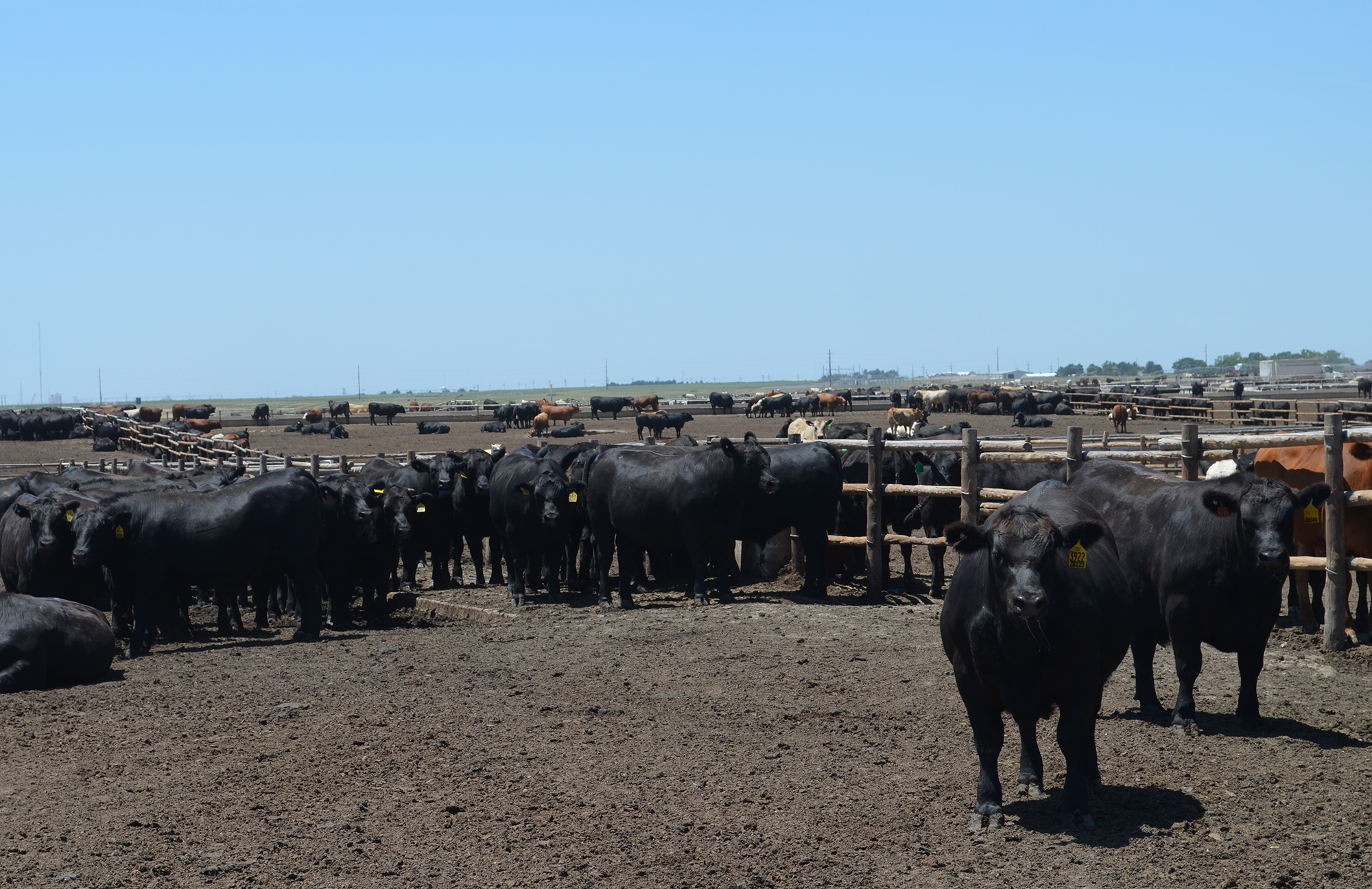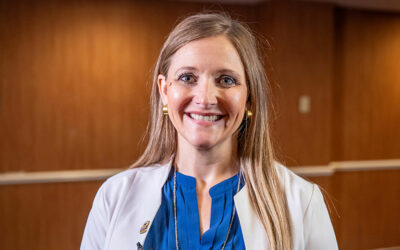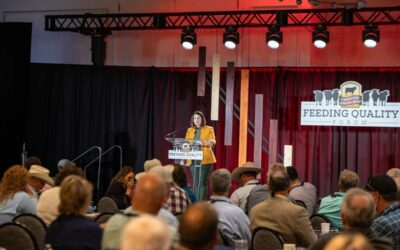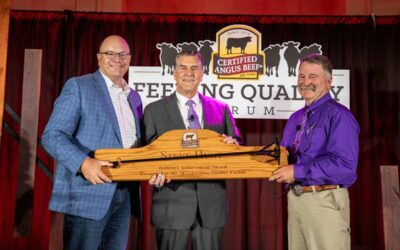
Bechtol wins Industry Achievement Award
By Steve Suther
When David Bechtol is honored at the 2013 Feeding Quality Forums with the Industry Achievement Award, colleagues and clients will catch a glimpse of recent history that laid the foundation for many of the ways they handle cattle health today.
“As one of the very first veterinary feedlot consultants, he evolved with a very young cattle feeding industry as it was starting up and maturing,” John Pollreisz said. “The role of the veterinary feedlot consultant grew as the industry did – it went hand in hand.”
Pollreisz, now managing veterinarian for beef cattle at Zoetis, started working for Bechtol at the Palo Duro Consultation Research & Feedlot practice in the late 1980s, when the practice had 11 years of work behind it. Bechtol began the consulting business after nearly a decade in general practice in Dimmitt, Texas.
It was in Dimmitt that he realized a different approach to cattle production called for a different approach to animal health. One of the first “bad wrecks” he saw in cattle health was near the first attempt to feed tens of thousands of animals in a confined system – reducing death loss became a very apparent priority.
“I knew at that time I was going to have to get more involved with the total program – not just the individual animal – and really come up with some ideas,” Bechtol said. “All of a sudden, I became a feedlot consultant rather than just an individual animal treater.”
But his influence didn’t stop with the animal.
Bechtol was well known for his human customer service, too, and a knack for connecting with feedlot employees to help them help the animals under their care.
“He’d spend a lot of time working in the feedlot itself, very hands-on, working with the cattle health personnel, helping them identify health problems and medication,” Pollreisz said. “Dr. Bechtol is very innovative and service-oriented in his approach to his feedlot customers.”
As he spent more time in the budding feedlot business, it became clear that more research, data and assistance would be needed to allow the industry to continue to grow in a healthy manner. Bechtol found a solution to that, too.
His “Cattle Accounting System” was one of the original record keeping systems for animal health in the early ’70s.
“With that, we could become more precise in what we were trying to do, what our goals were, and also evaluate our processing and treatment programs and come up with better answers in the feedlot,” Bechtol said. “So we progressed from being an individual animal treater to a person that had computerized records and was setting up goals.”

But even that wasn’t enough to satisfy his desire for data and research-based health decisions. In 1979, he founded a private research facility, Agri Research Center, Inc., to perform research trails in his own scientifically-controlled environment.
“Because of his work, we’re making far more objective, science-based decisions on health and how that affects economic parameters within the cattle feeding industry,” Pollreisz said.
Since its inception, the research facility has conducted more than 575 trials, Bechtol said, including research on vaccines, antibiotics, implants and more. But he, said, some advances and results from the decades of trails still shine above the rest in his mind.
“The thing I would be most proud of is the way we have been able to set up a Bovine Respiratory Disease complex,” Bechtol said, “And, it set up a model that we can evaluate products that would be repeatable and show good statistical design.”
Larry Corah, Vice President of Supply for the Certified Angus Beef ® brand, explained that is wasn’t just Bechtol’s desire to acquire animal health data that made him unique in those early years, but his interest in then sharing it for the improvement of the entire industry.
“He played a key role in not only working with those feedlots, but also knowing that data needed to be collected and shared,” Corah said. “Having that documentation – and also the analysis of what problems they may have had – allows them to create health procedures that played off past issues and dictated future health programs. That was huge in developing the feedlot business.”

As a charter member, first president and now lifetime member of the Academy of Veterinary Consultants, Bechtol used that data and information to bring the young, emerging industry together.
“When we graduated from veterinary school back in the mid- to late-’60s, we weren’t taught feedlot medicine on a routine basis. So there were several of us who got together and said, well, we need to exchange some ideas on, what are you doing here? How are you doing that?” Bechtol recalled. “Now the Academy has grown from that original 11 or 12 people to over 750 veterinarians and more than 40 states involved.”
Bechtol is also past president of the Texas Veterinary Medical Association, American Association of Bovine Practitioners, American Society of Agricultural Consultants and committee and council member in the American Veterinary Medical Association.
“In every profession there is an identified leader, a pioneer, an individual who is really looked up to by the profession,” Corah said. “David Bectol is truly one of those industry leaders. You always hear a positive response to the mention of his name, not only because of his incredible skill set, but also for his leadership in the industry.”
Bechtol will be honored at the seventh annual Feeding Quality Forum Aug. 20 in Omaha, Neb., and Aug. 22 in Garden City, Kan., where he will share insights with the audiences. For more information about the educational event or to register, visit www.cabcattle.com or email mconley@certifiedangusbeef.com.
“He’s shown us all what a good veterinarian looks like,” Pollreisz said. “He really set the stage for subsequent vets to see a very ethical, service-oriented, high-integrity approach to veterinary medicine.”
Quality Wins, Again
Sara Scott, Vice President of Foodservice for Certified Angus Beef, emphasizes the importance of taste over price in the beef market during the Feeding Quality Forum. As consumer demand for high-quality beef grows, Scott highlights the need for increased supply and encourages communication with packer partners to meet the demand for Prime beef.
Feeding Quality Forum Shares Market Outlook, Path to Meeting Demand
The beef demand success story of the past is also the industry’s roadmap for the future, said speakers at this year’s Feeding Quality Forum. The program covered everything from current market conditions and technology to price forecasts and advancements on the horizon.
Steve Hunt Honored with the 2023 Industry Achievement Award
When the cattle industry needed a leader, Steve Hunt stepped up. Sure, it was a group effort to launch U.S. Premium Beef – ranchers, cattle feeders and allied industry – but they all say one man made the difference between success and failure.



